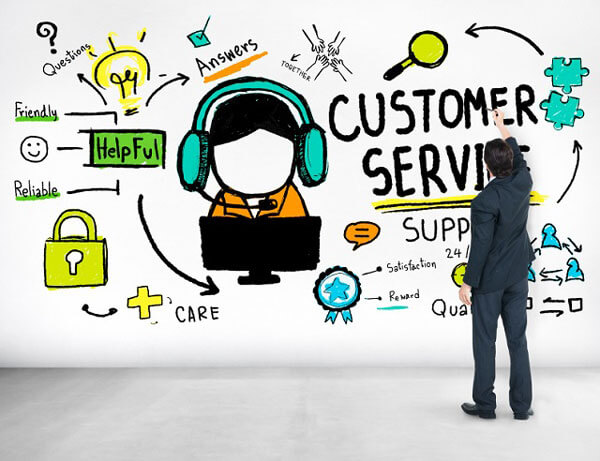Business Customer Service: How to Build Strong Relationships and Improve Satisfaction
In today’s competitive market, business customer service is one of the most critical aspects of achieving long-term success. Good customer service not only enhances customer satisfaction but also builds strong relationships, boosts loyalty, and improves your brand reputation. Whether you’re running a small business or a large corporation, delivering exceptional customer service is essential for standing out in a crowded marketplace.
In this article, we’ll explore the importance of business customer service, the key elements that make up excellent service, and actionable tips to elevate your customer experience. From effective communication to solving problems quickly, these strategies will help you build a more customer-centric business.

Why Business Customer Service Matters
Customer service is more than just answering questions or resolving complaints. It’s about creating a positive experience that leads to trust and loyalty. Exceptional customer service can turn one-time buyers into repeat customers and even brand advocates. Here’s why it’s important:
-
Customer Retention: Satisfied customers are more likely to return. Building strong relationships helps increase repeat business and customer loyalty.
-
Brand Reputation: Word-of-mouth is a powerful marketing tool. Positive customer experiences lead to positive reviews and recommendations, which build your brand’s reputation.
-
Increased Revenue: Good customer service leads to customer loyalty, which results in higher lifetime value. Happy customers are also more likely to spend more and make referrals.
-
Competitive Advantage: In a market where most businesses offer similar products and services, customer service can set you apart from your competitors.
Key Elements of Excellent Business Customer Service
To deliver top-notch customer service, there are several key elements you need to focus on. Here are the most important factors:
1. Effective Communication
Clear and effective communication is the cornerstone of great customer service. It’s essential to actively listen to your customers, understand their needs, and provide clear solutions. Whether it’s face-to-face, over the phone, or online, communication must always be professional, friendly, and responsive.
2. Personalization
Every customer is unique, so tailoring your service to meet their specific needs is crucial. Personalizing the customer experience shows that you value their individual preferences, making them feel special and more connected to your business.
3. Quick Response Times
Customers expect fast responses, especially in today’s digital age. Delays in addressing their concerns can lead to frustration and negative reviews. Whether through live chat, email, or social media, ensure that your response times are as quick as possible.
4. Problem-Solving Skills
No matter how great your products or services are, problems will arise from time to time. How you handle these issues can make or break a customer’s experience. Quick resolutions, empathy, and the ability to go the extra mile to fix the situation will leave a lasting positive impression.
5. Consistency
Consistency is key in building trust. Customers should know that they will receive the same high level of service every time they interact with your business. Whether they’re speaking to a sales rep or a customer service agent, the experience should be seamless and reliable.

Tips to Improve Your Business Customer Service
Now that we’ve covered the key elements, let’s dive into actionable tips you can implement to enhance your business customer service:
1. Train Your Team Regularly
Invest in ongoing training for your customer service team to ensure they have the skills and knowledge necessary to handle customer inquiries and complaints effectively. Training should focus on areas such as communication, product knowledge, empathy, and conflict resolution.
2. Leverage Technology
Use technology to streamline your customer service processes. Automated systems, chatbots, and customer relationship management (CRM) tools can help you manage interactions efficiently and provide personalized experiences.
3. Set Up a Feedback System
Encourage customers to provide feedback on their experience with your business. Whether through surveys, social media, or email, collecting feedback helps you understand areas of improvement and identify opportunities to enhance your service.
4. Be Available Across Multiple Channels
Customers expect to reach businesses through various channels, including phone, email, live chat, social media, and even in-person. Offering multiple communication options increases accessibility and customer satisfaction.
5. Acknowledge and Apologize for Mistakes
No business is perfect. When mistakes happen, take ownership and apologize sincerely. Customers appreciate when companies acknowledge errors and take the necessary steps to rectify them.
6. Reward Loyalty
Show appreciation for your loyal customers by offering rewards or special deals. This can be through loyalty programs, discounts, or personalized offers. It strengthens the bond between you and your customers.
How Business Customer Service Impacts Customer Retention
Customer retention is essential for the growth and sustainability of any business. Studies have shown that retaining an existing customer is far less expensive than acquiring a new one. Here’s how customer service plays a crucial role in retention:
-
Building Trust: When customers know they can rely on your service, they’re more likely to stick around. Trust is the foundation of loyalty.
-
Creating Positive Experiences: Positive experiences keep customers coming back. Consistently exceeding their expectations in service ensures they remain loyal to your brand.
-
Handling Complaints Effectively: When customers face an issue, the way you handle it will determine if they return. Quick, empathetic resolutions show customers that their satisfaction is your priority.
The Role of Technology in Business Customer Service
In today’s digital world, technology plays a significant role in enhancing business customer service. Here’s how you can incorporate it:
1. Customer Service Software
Investing in customer service software, such as a CRM system, helps track interactions, manage support tickets, and streamline communication. This ensures that no customer inquiry goes unanswered.
2. Live Chat and Chatbots
Live chat and chatbots provide immediate assistance to customers, allowing them to get quick answers to their questions. They are especially useful for businesses that operate 24/7, ensuring customers can always access help when needed.
3. Social Media Monitoring
Social media is an essential platform for customer engagement. Monitor your business’s social media accounts regularly to respond to customer queries, complaints, and feedback in real-time.
.jpg)
Customer Service Best Practices for Your Business
To deliver exceptional customer service consistently, here are some best practices to follow:
-
Be Proactive: Don’t wait for customers to reach out with problems. Anticipate their needs and offer solutions in advance.
-
Empathy is Key: Always show empathy and understanding, even when dealing with upset customers. A little compassion can go a long way.
-
Offer Self-Service Options: Provide your customers with self-service options like FAQs, knowledge bases, and troubleshooting guides to resolve issues independently.
Frequently Asked Questions (FAQs) About Business Customer Service
1. What makes customer service exceptional?
Exceptional customer service is marked by fast response times, personalization, clear communication, and the ability to solve problems quickly and effectively.
2. How do I handle difficult customers?
When dealing with difficult customers, remain calm, listen actively, acknowledge their frustration, and offer a solution. It’s essential to keep the conversation professional and empathetic.
3. What role does customer service play in business success?
Customer service plays a crucial role in business success by building trust, fostering customer loyalty, and creating positive brand experiences, which lead to higher sales and long-term growth.
4. How can I improve my customer service team’s performance?
Improving your customer service team’s performance requires regular training, setting clear expectations, and providing the tools and technology needed to do their job efficiently. Encourage feedback and create a culture of continuous improvement.
5. How can I measure the effectiveness of my customer service?
You can measure customer service effectiveness by tracking key metrics such as customer satisfaction (CSAT), net promoter score (NPS), first-response time, and resolution time.
Conclusion
Business customer service is an integral part of any successful business strategy. By focusing on clear communication, problem-solving, personalization, and consistency, you can create a customer experience that leads to increased satisfaction, loyalty, and retention. Investing in your customer service processes, whether through training or technology, is essential for long-term business success.
Happy customers are the backbone of any thriving business. By continuously improving your customer service and listening to customer feedback, you’ll not only improve your customer relationships but also gain a competitive edge in your industry.
:max_bytes(150000):strip_icc()/Term-Definitions_customer-service-2ef862f130cf4651b2c3b3bf14d87492.jpg)



